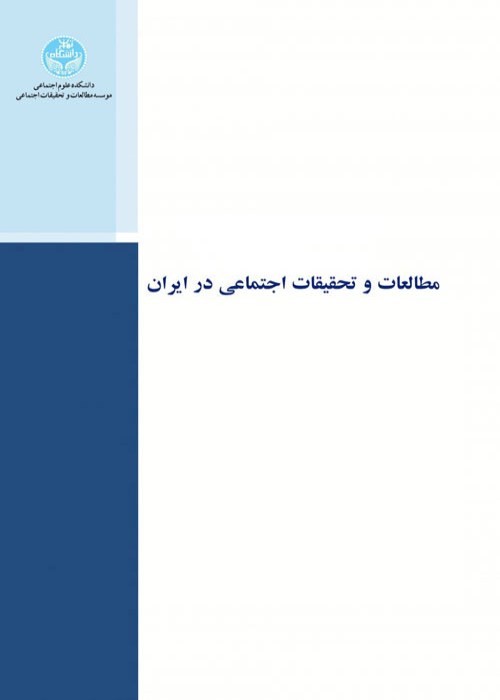Social Distance and Economic Character Assessing the Relationship between Social Distance and Economic Characteristics in the Attitude of Tourists and Businessmen Living in Yazd towards Yazidis
Author(s):
Article Type:
Research/Original Article (دارای رتبه معتبر)
Abstract:
Introduction
The concept of social distance refers to the degree of acceptance or non-acceptance that is felt by members of a group to join a group compared to other specific groups. This concept refers to the degree of acceptance and feeling of distance or closeness in ethnic groups as well as urban ghettos. The concept of social distance in the field of economic activities causes convergence and divergence among economic actors in order to pursue economic goals among them. The city of Yazd has special economic characteristics due to its location due to for being surrounded by the desert and special cultural features. The people of Yazd, because of their spirit of coexistence and tolerance, are in long-term interaction with other groups and subcultures. The purpose of this study is to assess and analyze the relationship between “social distance” and economic interaction between non-native businesspeople and Yazdi tourists with the people of Yazd.Method
The method used in this research is quantitative, which has been completed with a standard and researcher-made questionnaire with a high validity of 70% from a sample of 300 tourists and non-native businessmen in the form of multi-stage cluster sampling in the tourism context in Yazd.Finding
The results showed that the respondents' sense of social distance in relation to the people of Yazd is relatively low and they have a more positive attitude towards having economic relations with Yazidis. However, the feeling of social distance of a non-profit business is greater than that of tourists. The results of this study also show that tourists have a more positive attitude compared to businesspeople, both in relation to social distance and in relation to measuring economic characteristics. The results also show that there was a significant difference between the contextual questions of age, gender, education and occupation in relation to social distance. There is a positive and significant relationship between social distance and economic characteristics, so that the lower the social distance, the more positive the attitude towards the economic characteristics of Yazidis and the more the social distance increases, the more negative the attitude towards the economic characteristics of Yazidis becomes.Conclusion
Action based on social distance is the level of distance and difference that individuals should consider in their social interactions with others. The issue of social distance, based on the theory of symbolic interaction, with the concepts of “self and other communication. In this theory, actors act through the meaning they attribute to the actions of others. Accordingly, symbolic interaction of categories such as “self, other and meaningful action” gives meaning to the action of individuals through separation and differentiation in their action with others and affect the collective identity as another and “separate selves”. In essence, social distance directs the action of individuals through limiting and differentiating characteristics. Social distance in the economic exchange of actors directs their actions and can lead to the emergence of ethnic entrepreneurship in urban ghettos. Accordingly, the social distance approach implies the role of social factors such as class structure and group and ethnic status on economic activities. With the approach of social distance in economic action, factors such as race, ethnicity and characteristics of residential areas and social factors such as residence and education affect economic success. In Iran, studies related to social distance have been relevant due to their cultural diversity and the existence of multiple mosaic cultures, and many studies have been conducted. However, the studies are less relevant to economic relations, and in this research, an attempt has been made to measure the economic behavior of non-Yazidi businessmen living in Yazd and tourists in relation to the people of Yazd. The innovative aspect of this paper is the importance of economic and social ties in economic relations.Keywords:
Language:
Persian
Published:
Quarterly of Social Studies and Research in Iran, Volume:10 Issue: 2, 2021
Pages:
443 to 469
magiran.com/p2290087
دانلود و مطالعه متن این مقاله با یکی از روشهای زیر امکان پذیر است:
اشتراک شخصی
با عضویت و پرداخت آنلاین حق اشتراک یکساله به مبلغ 1,390,000ريال میتوانید 70 عنوان مطلب دانلود کنید!
اشتراک سازمانی
به کتابخانه دانشگاه یا محل کار خود پیشنهاد کنید تا اشتراک سازمانی این پایگاه را برای دسترسی نامحدود همه کاربران به متن مطالب تهیه نمایند!
توجه!
- حق عضویت دریافتی صرف حمایت از نشریات عضو و نگهداری، تکمیل و توسعه مگیران میشود.
- پرداخت حق اشتراک و دانلود مقالات اجازه بازنشر آن در سایر رسانههای چاپی و دیجیتال را به کاربر نمیدهد.
دسترسی سراسری کاربران دانشگاه پیام نور!
اعضای هیئت علمی و دانشجویان دانشگاه پیام نور در سراسر کشور، در صورت ثبت نام با ایمیل دانشگاهی، تا پایان فروردین ماه 1403 به مقالات سایت دسترسی خواهند داشت!
In order to view content subscription is required
Personal subscription
Subscribe magiran.com for 70 € euros via PayPal and download 70 articles during a year.
Organization subscription
Please contact us to subscribe your university or library for unlimited access!



